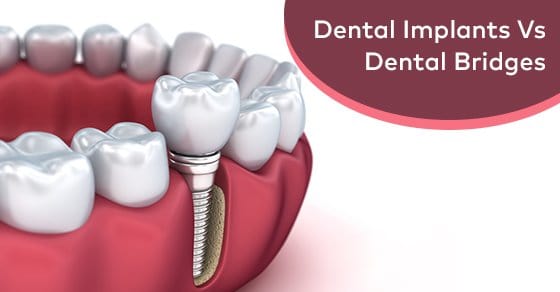When you lose a tooth, you have two main replacement options. You can either undergo treatment for dental implants, or you can choose a dental bridge treatment.
These options are often offered by dental professionals, but rarely are the various advantages and disadvantages explained. To get rid of the confusion surrounding the two, we’re reviewing both dental implants and bridges to highlight the differences between the procedures.
Education is the key to making the treatment decision that’s right for you!
Dental Implants can be used to replace a Number of Teeth
A leading application advantage of dental implants is that the dentist can use them to replace more than one missing tooth. Often when a dental bridge is used, adjacent teeth within the affected area are required for support.
Implants can last a Lifetime When Professionally Applied
While bridges should be replaced every 10 to 15 years, implants can often last a lifetime for the patient when they’re expertly applied and well-maintained. Even if the implant is inserted at a young age, proper care will allow it to remain a permanent fixture within your smile! Another bonus is being able to leave adjacent teeth to the space alive.
Implants are Often Easier to Maintain
Because implants take the form of natural teeth, they’re easier to maintain than dental bridges. Patients can floss in between their teeth after an implant has been applied and will be able to maintain their brushing routine as normal. This can help eliminate the need for a change in their oral care routine.
Dental Bridges Treatment is Simpler
As opposed to implant work, which can require a number of treatments, dental bridges can be applied to the patient’s teeth in two to three visits. This helps simplify the treatment process, and can sometimes reduce the overall cost and time of the procedure.
Consider Your Options Carefully Alongside a Specialist
We know now that dental implants might be a more expensive form of treatment than bridges, but implants can be used to replace several missing teeth. Those with significant bone damage, however, might consider bridge work for their treatment.
By running through these options with your dental health professional, you can come to a mutual decision on which is the best choice for your future oral health requirements!
